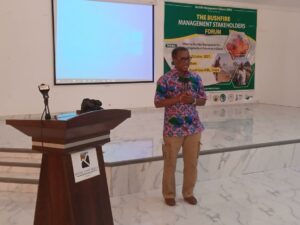Monetization of grass is key to curbing bushfires – Prof. Millar
 Prof. David Millar, President of the Millar Institute for Transdisciplinary and Development Studies (MITDS) also known as the Millar Open University, has said monetization of grass is key to curbing bush burning in the country.
Prof. David Millar, President of the Millar Institute for Transdisciplinary and Development Studies (MITDS) also known as the Millar Open University, has said monetization of grass is key to curbing bush burning in the country.
He said Traditional Authorities and the security agencies had done their best over the years to control the spate of bushfires in the country, but had not succeeded because of challenges of relationships and political interference.
Prof. Millar was speaking during a bushfire management stakeholders’ forum in Jirapa in the Jirapa Municipality of the Upper West Region on the theme: “Bushfire Management for Improved Agriculture Outcomes in the Upper West Region of Ghana”.
The forum was organized by the Resilience Against Climate Change (REACH) project in collaboration with the Ghana Agriculture Sector Investment Programme (GASIP), the Market Oriented Agriculture Programme (MOAP), Training and Extension for Conservation Agriculture (TECAS) and the Centre for Indigenous Knowledge and Organizational Development (CIKOD); all members of the Bushfire Management Alliance (BMA).
Prof Millar said the best way left was to create a motivation situation around grass, which would then compel people to see the need to rather protect the grass instead of burning.
“If you sensitize people to understand that grass has value and is a major income earner, nobody will tell them to protect it for their benefit”, he said.
The President of MITDS who had been championing grass charcoal production, suggested the establishment of a grass charcoal production factory in the country and explained that it would attach economic value to the grass and would cause people to change their attitude towards bush burning.
Mr Simon Kunyagna, a Deputy Project Manager of EU-REACH noted that the universal call to action by the Sustainable Development Goals (SDGs) to end poverty, protect the planet and ensure that all people enjoy peace and prosperity by 2030 would remain a mirage, especially in the Sudan and Guinea Savannahs, if pragmatic steps were not taken to end or curtail the perennial bush burning and the resulting devastation it caused the environment.
He said it was against this backdrop of a pressing need for coordinated efforts to bring bushfire under control that the BMA emerged, adding that its stakeholders were convinced that the goal of improving productivity and sustainability of agriculture was only possible if calculated steps were taken to manage bushfires.
“To this end, the BMA deemed it necessary to coordinate strategies and dedicate resources to the effective management of bushfire in the Guinea and Sudan Savannah zones of Ghana”, he said.
Mr Kunyagna encouraged organizations tackling bushfires as separate entities to break the silos and join hands so that they could work together to end the menace.
Dr Hafiz Bin Salih, the Upper West Regional Minister in a speech read on his behalf, said Ghana’s economy was dependent on climate-sensitive sectors such as agriculture, fisheries, industry, tourism and forestry, which supported a chunk of employment and livelihoods of most Ghanaians.
He noted, however, that human activities including; bush burning, tree felling for fuel, sand and gravel winning and recently small-scale mining continued to threaten to people’s livelihoods in the region.
Dr Bin Salih commended members of the Alliance for initiating the important dialogue with other relevant stakeholders to discuss prudent actions and enforcement strategies to tackle bushfires.
Mr Emmanuel Sasu Yeboah, the Upper West Regional Director of Agriculture, said bushfires threatened conservation agriculture in the region and urged the forum to discuss and come out with practical strategies to end bushfires and promote conservation agriculture.
Naa Dikomwine Domolae, the President of the Upper West Region House of Chiefs while commending the BMA for the initiative, also pledged their continued partnership with the Municipal and District Assemblies in the region to enact by-laws and enforce already existing ones to prevent bush burning.
Source: GNA
